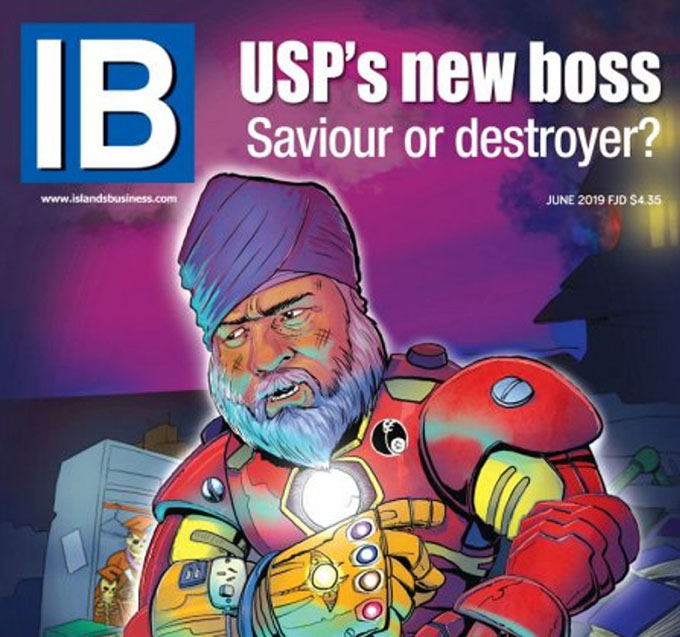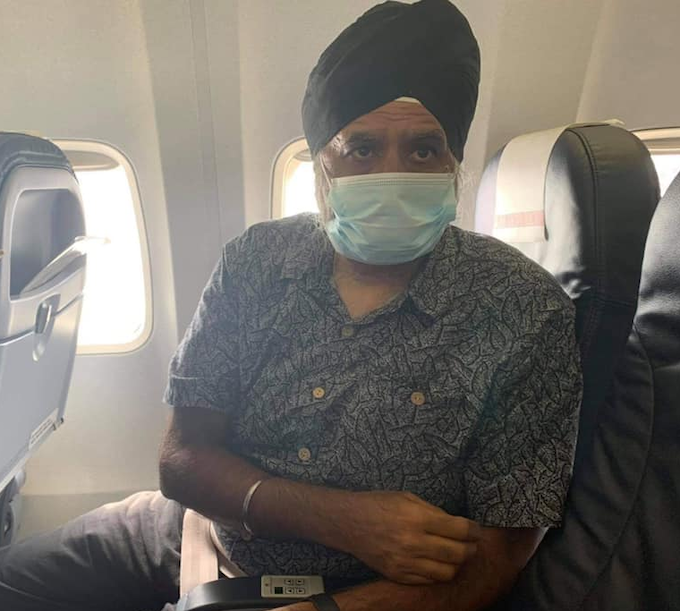By Michael Field
When the University of the South Pacific’s vice-chancellor, Professor Pal Ahluwalia, was hauled out of his Suva, Fiji, home this week and deported, it had nothing to do with his views on education or tertiary management.
With his wife and nursing lecturer Sandy Price they were driven across curfew-locked down Fiji to be put on a plane to Australia.
It was not an action designed to make USP a better place, or to improve life for Fiji’s young people.
It was bitterly personal.
“You have nailed it,” Professor Ahluwalia told Pacific Newsroom. “It is precisely a case of ‘let’s get rid of this man because he exposed too much corruption’.”
Professor Ahluwalia and Price were seized late last Wednesday and deported on Thursday morning to Brisbane where, due to covid-19, they are now in managed isolation until February 18.
He is adamant that he remains vice-chancellor of the 12-nation regional USP and will keep managing the university.
Money was missing
Just over two years ago Professor Ahluwalia took over USP from vice-chancellor Professor Rajesh Chandra. He discovered much was wrong in the accounting department, and money was missing. A lot of money.
Professor Ahluwalia submitted a report to the USP Council and, in an abbreviated form, this led to the hiring of Auckland accountancy consultants BDO. When their damning report reached the university council, it was pretty much suppressed. Key details were kept from the public.
The BDO report was then leaked – not by Professor Ahluwalia or any USP staff – to Pacific Newsroom, prompting uproar.
As BDO linked corruption and missing millions efforts were begun to get Professor Ahluwalia fired.

These were mostly led by USP’s pro-chancellor, Winston Thompson. A Fijian, BDO’s report made it clear Thompson was acting for FijiFirst; not USP or its students.
Professor Ahluwalia said that until talking with Pacific Newsroom, he had not talked publicly about these connections. He was now because Pacific Newsroom had become a key influence in the debate in Fiji.
Getting rid of Professor Ahluwalia was part of that: “It’s as personal as that and Winston Thompson was Fiji’s ambassador to the United States, he is a diplomat and he has presided over several interesting, very interesting, downfalls of public institutions…”
‘The intimacies of politics’
Surely, it was put to Professor Ahluwalia, USP was bigger than just a couple of people. But that, he replied, was what it amounted to.
“It is really that, the intimacies of politics… the way these networks work, after all this is a very small country.”
Fiji refuses to accept BDO evidence, claiming their own Fiji Independent Commission Against Corruption (FICAC) had found no corruption.
BDO had pointed clearly to corruption and both Professor Ahluwalia and Price say they were close to getting to the bottom of the operation behind it.
“The best evidence I can provide for all of this at the moment,” Professor Ahluwalia said, “is that I am close, but don’t have evidence yet.

“What I would say as evidence is that 2019 and 2020 we had to put a number of financial restrictions in place, but the fact that I returned, in 2020, a $28.3 million surplus on a university that did not receive grants from Fiji and Australia. That tells me how much they were leaching out of the system.”
Was it a basic kind of fraud, people helping themselves to cash: “That’s what it seems to me. The bit I cannot figure out is that these accounts are audited by auditors and how were they doing it?”
People complicit at USP
There were, Price suggested, a lot of people in USP that were complicit.
This week, as the Pacific Forum met in Zoom session to elect a new secretary-general, the Fiji government moved against Professor Ahluwalia and Price. He found it interesting that this was the week.
“There was a special council meeting (a Friday week ago) and at that meeting the President of Nauru (Lionel Aingimea, the current USP chancellor) raised my contract as an issue.”
He wanted it placed on the agenda because he was concerned about it. Both Thompson and the council’s Fiji representative, Mahmood Khan, expressed concern at having it on the agenda, saying there was no supporting paper to explain its presence.
They said they needed to know what the issue was.
“And Lionel gave them a hint, he said it’s about visa issues and then he said, well we will send a paper.”
It was drafted and it noted that the Fiji Sun, a pro-Bainimarama newspaper, had reported in a gossip section that someone from “a big school for big students” could be sacked.
‘Draconian barbaric act’
Professor Ahluwalia said as soon as that appeared, they knew they had to act: “On Wednesday they did this draconian barbaric act, trampling over our human rights.”
As to the Pacific Islands Forum Summit: “I wouldn’t put anything in Fiji as just a coincidence. They probably knew all the leaders were busy.
For himself, and the USP Council, Professor Ahluwalia is still the vice-chancellor. His contract remained valid and he had done nothing wrong: “I suppose it’s a wrongful dismissal which is what I am arguing… the employer still has a duty of responsibility even if the government chooses to deport you on fabricated charges.”
Given all the stresses, it would be understandable that Professor Ahluwalia and Price might want to cut their losses, but that is not so: “I was hired to lead USP and take it forward, I think it has a lot of potential, I don’t think it has to be just beholden to Fiji and one of the best things that would happen to the university is for the vice chancellor to operate from outside of Fiji and actually really lift the education of the rest of the region and give the region more attention while paying attention to Fiji as well.
“Covid has taught us that the university can be run from its other campuses. After all, the USP campuses are run from Laucala so the converse is absolutely possible,” he said.
“I have nothing against the people of Fiji and my students and staff in Fiji are the reason I have so much support so I want to make sure they are supported.”
He could live in another USP member country: Samoa is already waving the welcome mat.
The university would survive.
Damage done to Fiji
“I think the damage is not being done to USP, the damage is to the Fiji government because of their actions in violating our human rights.”
This kind of passionate battle augurs well for USP: “Its international reputation is enhanced, that there are people in it with ethical people trying to clean it up.”
Ethics, integrity and good governance mattered.
“My message to the students is very clear. Come to USP, a great regional institution, committed staff, we are there, it remains the premier regional institution and when this vice-chancellor is back he will continue on the march to make sure USP becomes an even better institution and be ready as a university for the next 50 years.”
Michael Field, the New Zealand author and an independent journalist, has also been deported from Fiji on several occasions under different prime ministers and remains persona non grata. This article is republished from The Pacific Newsroom with permission.
Article by AsiaPacificReport.nz






